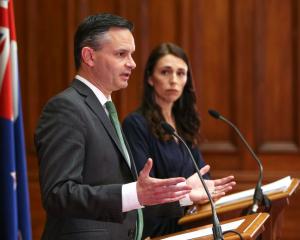
Mr Campbell, from Auckland, said yesterday business needed continuity around the current employment and labour relations framework.
''Many members are raising their concerns about what will happen to workplace relations if there is a change as outlined in Labour's fair pay agreements policy.''
Mr Campbell urged employers to take a close look at the policy
and plans for significant changes to the enterprise-level bargaining framework.
Otago-Southland Employers Association chief executive Virginia Nicholls said her members were increasingly concerned about fair pay agreements.
With the Employment Relations Act (2000), there was a clear framework for how employers and employees negotiated in good faith.
That gave companies the flexibility to negotiate agreements with their workers to best meet the needs of the operation. That came with responsibilities employers must abide by, she said. If they did not, they faced hefty penalties along with irreparable reputational damage.
''What we have got now is working for modern employers. Why change it?''
Labour's policy says FPAs would be agreed by businesses within an industry and the unions representing workers within that industry. The agreements would set basic standards for pay and other employment conditions, according to factors including job type and experience.
The recent care and support workers' settlement was an example of how employers, employees and government could together create an agreement setting base conditions across an industry.
''By setting a floor, FPAs will prevent the 'race to the bottom' seen in some industries where good employers are undercut by bad employers who reduce labour costs through low wages and poor conditions.
''FPAs will create a framework for fair wage increases where good employers are not commercially disadvantaged for doing the right thing,'' Labour said.
Otago Chamber of Commerce chief executive Dougal McGowan said Labour's policy was light on detail and much work would have to be done to sort out the issues.
That was likely to cause disruption. Conditions imposed in the FPAs were likely to slow productivity as issues like changes to rosters, programming production and union coverage were finalised. Some industries no longer had union coverage, he said.
Council of Trade Unions president Richard Wagstaff said the FPAs would set basic employment conditions across an industry.
''This is such an important issue for working people whose pay and conditions are constantly under threat.''












